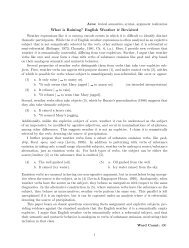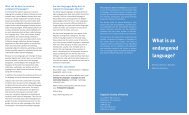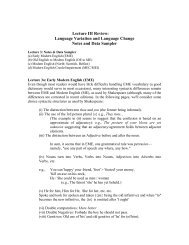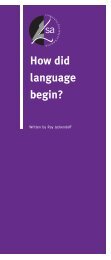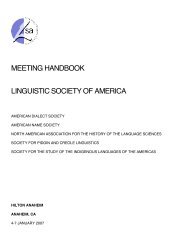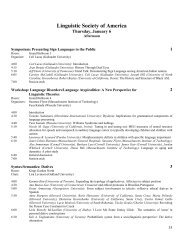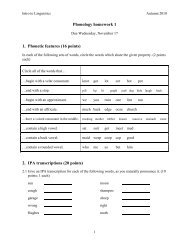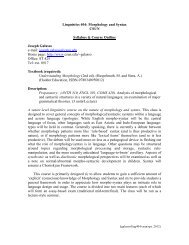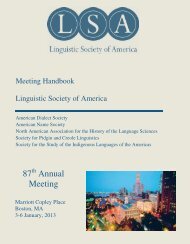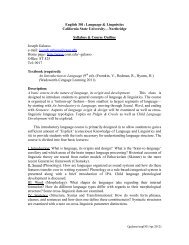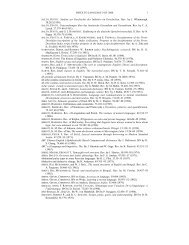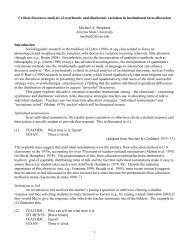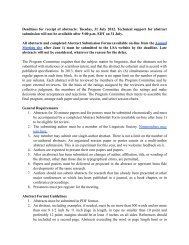here - Linguistic Society of America
here - Linguistic Society of America
here - Linguistic Society of America
Create successful ePaper yourself
Turn your PDF publications into a flip-book with our unique Google optimized e-Paper software.
SymposiumFriday, 4 JanuaryLanguage and Complex Adaptive SystemsClarendon/Berkeley9:00 – 10:30 AMOrganizers:Participants:William Kretzschmar (University <strong>of</strong> Georgia)Diane Larsen-Freeman (University <strong>of</strong> Michigan)Allison Burkette (University <strong>of</strong> Mississippi)William Kretzschmar (University <strong>of</strong> Georgia)Diane Larsen-Freeman (University <strong>of</strong> Michigan)In Mitchell's (2009:13) definition, a complex system is "a system in which large networks <strong>of</strong> components with no central controland simple rules <strong>of</strong> operation give rise to complex collective behavior, sophisticated information processing, and adaptation vialearning or evolution." Complex systems, also known as complex adaptive systems (CAS), have received a great deal <strong>of</strong>transdisciplinary attention, especially since 1984, when the Santa Fe Institute was founded. In linguistics, CAS received earlyallusive discussion: Lindblom, MacNeilage, and Studdert-Kennedy published a 1984 paper on self-organizing processes inphonology; Hopper presented his seminal paper on "Emergent Grammar" in Berkeley in 1987; Langacker published "A Usage-Based Model" for cognitive linguistics in 1988. Gradually more papers attempting to use CAS in linguistics appeared in the 1990s(van Geert 1991, Mohanan 1992; Larsen-Freeman 1997; Lightfoot 1999). In the 2000’s, CAS language issues expanded.Mufwene used CAS in his argument about evolutionary biology as a metaphor for language change (2001, 2008; see also, Cr<strong>of</strong>t2000), as has Bybee (e.g., 2006; 2010). Larsen-Freeman and Cameron (2008) discussed complex systems and languageacquisition. Kretzschmar (2009) demonstrated how complex systems constitute speech, focusing on nonlinear distributions andscaling properties. Finally, Ellis and Larsen-Freeman (2009) assembled a collection <strong>of</strong> papers which brought a CAS perspective tobear on a variety <strong>of</strong> linguistic topics, including sentence processing and the evolution <strong>of</strong> brain and language. In this symposium,we will articulate some basic ideas <strong>of</strong> complex systems and present three applications to particular problems <strong>of</strong> interest tolinguists in order to highlight ways in which CAS can contribute insights to linguistics. Importantly, we believe that complexitytheory defines the relationship between language in use and any generalizations we may wish to make about it, which address theperennial problem in linguistics <strong>of</strong> the contrast between language as human behavior and language as system.We will start the symposium with a general introduction to basic terms in CAS such as "attractors" and "emergence" (as fromLarsen-Freeman and Cameron 2008), and also apply those principles to language in the form <strong>of</strong> nonlinear frequency distributionsand scale-free networks (as from Kretzschmar 2009).Diane Larsen-Freeman will then discuss in "A CAS Perspective on Language Acquisition”—how learners s<strong>of</strong>t assemble theirlanguage resources (Thelen and Smith 1994) while interacting with a changing environment. As learners do so, their languageresources change. She will propose that learning a language involves the constant enactment and adaptation <strong>of</strong> language-usingpatterns, which emerge in response to the affordances in a dynamic communicative situation.Allison Burkette will then present "Complexity from a Historical Perspective." Her talk will show linguists how speech changesover time within a community according to the prediction <strong>of</strong> complexity theory (as in Burkette 2001, 2009, 2011), with anemphasis on the essential connection between language and changing physical culture.Finally, Bill Kretzschmar will discuss "Complex Systems and Empirical <strong>Linguistic</strong>s" to demonstrate how complexity theoryimproves our understanding <strong>of</strong> sampling and measurement, and how nonlinear empirical distributional patterns <strong>of</strong> linguisticfeatures can be important for cognitive and grammatical choices.Abstracts:Allison Burkette (University <strong>of</strong> Mississippi)Bill Kretzschmar (University <strong>of</strong> Georgia)Diane Larsen-Freeman (University <strong>of</strong> Michigan)Introduction to language and complex adaptive systemsComplex systems are dynamic, nonlinear, and open systems. They are made up <strong>of</strong> numerous components which interact with oneanother to produce an overall system through self-organization. The system exhibits properties that are not the sum <strong>of</strong> itsindividual components. Constantly adapting to changing intra- and extra-systemic conditions, hence the name “complex adaptive95



